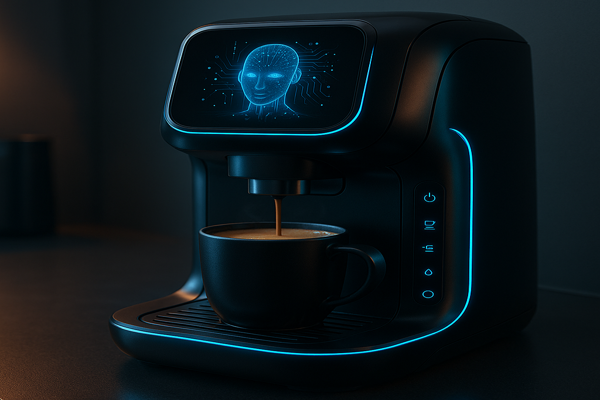Coffee culture is evolving faster than ever, not just in terms of flavors and trends, but also through technological innovation.
At the heart of this revolution is artificial intelligence (AI), a transformative force that’s reshaping how coffee is brewed, served, and even tasted.
From smart espresso machines to data-driven quality control systems, AI is redefining what it means to be a barista or coffee aficionado.
This article explores how AI is being integrated into the coffee world and what this means for consumers, café owners, and the future of specialty coffee.
AI and the Coffee Industry: A Natural Blend
The relationship between coffee and AI may seem unlikely at first. After all, coffee brewing is often seen as a craft, full of subtle nuances and personal touches. But that’s exactly why AI fits so well into this space.
Artificial intelligence excels in pattern recognition, precision, and repetition — all essential to brewing high-quality coffee consistently.
In an industry where variables like grind size, temperature, extraction time, and water pressure can make or break a cup, AI brings control and optimization.
Smart Coffee Machines: Learning from Every Brew
One of the most prominent examples of AI in coffee is smart espresso machines. These machines are capable of learning from barista inputs, tracking variables over time, and adjusting parameters to improve outcomes.
Some high-end machines now come with sensors and microcontrollers that collect data on every shot pulled. The AI system analyzes this data and makes recommendations or automatic adjustments.
This helps maintain consistency across shifts and staff — a challenge in busy cafés.
For example, AI can detect slight changes in grind size or tamping pressure and adjust the water temperature or extraction time accordingly. This reduces human error and ensures that each cup meets the intended flavor profile.
Personalization Through AI
AI doesn’t just serve baristas — it also enhances the customer experience. Some cafés use AI-driven systems that remember individual customer preferences. By analyzing order history, these systems suggest new drinks or modify recipes to match personal tastes.
This level of personalization can create stronger customer loyalty. Imagine walking into your favorite café and having the machine automatically brew your perfect flat white — exactly how you like it, without needing to say a word.
AI in Green Coffee Sorting and Roasting
Beyond the café, AI is also making waves in the supply chain. In green coffee processing, AI-powered vision systems are used to sort beans with incredible accuracy.
These systems can identify defects, variations in size, or color inconsistencies faster than human workers, leading to higher-quality batches.
Roasting is another area where AI is proving invaluable. Roasting profiles can be complex, and slight errors can ruin the flavor.
AI can monitor variables like temperature curves, airflow, and humidity in real time, making micro-adjustments to produce consistent and high-quality roasts.
This doesn’t replace human roasters but gives them a powerful tool to refine their craft.
Predictive Maintenance and Operational Efficiency
AI also helps behind the scenes with predictive maintenance. Instead of waiting for a machine to break down, AI systems monitor internal components and usage patterns to predict when maintenance is needed.
This minimizes downtime, reduces costs, and extends the lifespan of expensive equipment. For café owners, this kind of efficiency can make a big difference in profitability.
Some AI systems even monitor inventory in real time, analyzing trends to anticipate when supplies will run low and automatically place orders. This ensures that ingredients are always fresh and available without overstocking.
Training Baristas with AI
Training a new barista can take weeks, especially when it comes to mastering espresso techniques and milk frothing. AI-powered training tools are changing this.
Virtual simulations and smart training machines guide new baristas through each step, offering feedback based on performance. This allows consistent and faster training across multiple locations, especially useful for coffee chains.
Some machines provide real-time guidance during brewing, helping baristas perfect their technique on the job. As a result, even less experienced staff can produce café-quality drinks.
Data Analytics and Flavor Profiling
AI thrives on data — and coffee provides plenty of it. From bean origin and roast profile to brewing method and customer feedback, each cup holds a wealth of information.
AI can analyze this data to find correlations between variables and flavor outcomes. This kind of insight allows roasters and baristas to develop new flavor profiles or refine existing ones based on real-world performance.
It also opens the door to new forms of sensory research. Some systems use AI to predict how a coffee will taste based on its chemical composition, helping professionals identify standout beans before even brewing them.
The Rise of Coffee Robots
Another futuristic application is robotic coffee makers. These automated systems can brew and serve coffee with minimal human input. Some models already operate in airports, offices, and shopping malls, offering quality coffee 24/7.
These robots are powered by AI algorithms that manage brewing precision and even customer interaction through touchscreens or voice assistants. While they don’t replace artisanal cafés, they provide convenience and consistency in high-traffic areas.
Challenges of AI in Coffee
Despite its benefits, integrating AI into coffee culture isn’t without challenges. High-tech equipment comes with a steep learning curve and cost. Smaller cafés might struggle to afford or maintain these systems.
There’s also the risk of over-automation. Coffee culture values human connection — the smile from the barista, the handmade feel of a cappuccino. Striking a balance between technology and tradition will be crucial.
Data privacy is another concern, especially when AI systems store customer preferences or monitor staff performance.
Looking Ahead: What’s Next?
The future of AI in coffee is full of possibilities. We may soon see apps that recommend beans based on your mood, or home machines that learn your taste over time and adjust recipes automatically.
AI might also contribute to sustainability efforts, helping reduce waste by optimizing portions and predicting demand. Farms could use AI to monitor crop health or predict the best harvest times, improving yield and quality.
As AI continues to advance, it will likely become an invisible yet essential part of the coffee experience, enhancing quality without overshadowing the human touch.
Why Embracing AI Matters
For baristas, embracing AI doesn’t mean giving up craftsmanship — it means gaining tools to focus more on creativity and connection. For café owners, it means greater efficiency, lower costs, and higher customer satisfaction.
And for coffee lovers, it means more consistent, personalized, and possibly even better-tasting coffee.
The future of coffee isn’t just in the beans — it’s in the code.

Artur is a coffee enthusiast and content creator passionate about barista techniques and coffee culture. With a sharp eye for detail and a love for learning, he shares practical tips, brewing guides, and gear insights to help readers elevate their coffee experience — from home brewers to aspiring professionals.
